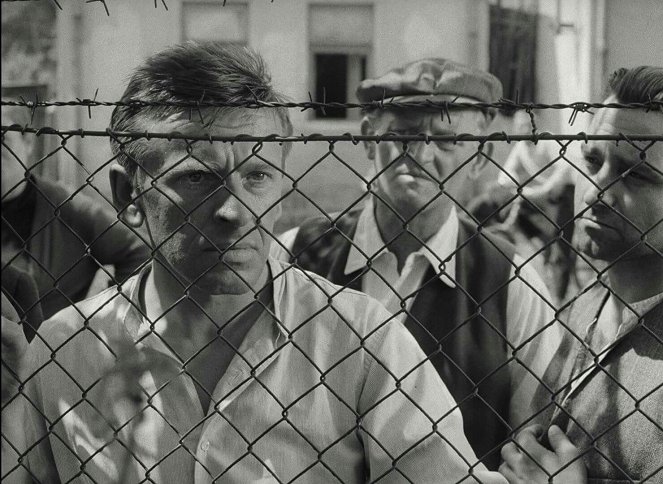Cinematography:
Vladimír NovotnýComposer:
Zdeněk LiškaCast:
Ida Kamińska, Jozef Kroner, František Zvarík, Hana Slivková, Martin Hollý st., Elena Zvaríková-Pappová, Martin Gregor, Adam Matejka, Mikuláš Ladižinský (more)Plots(1)
‘Tóno’ Brtko, a poor carpenter, is appointed by his despised Nazi brother-in-law to be 'Aryan controller' of an old Jewish widow’s sewing shop in a Nazi-occupied Slovakia in 1942. The widow, Rozalia (Yiddish theatre legend Ida Kamińska, nominated here for a Best Actress Oscar® for her performance) is near deaf, isolated and partially sighted, barely even aware of the war or able to comprehend the danger in which she lives. Believing Tóno is simply her new assistant, the two develop a friendship that sees him maintaining that fiction as he attempts to protect her from the encroaching Nazi horror. The Shop on the High Street is a complex tale of common lives disturbed and destroyed by war. Wonderfully written and performed, and with an extraordinary Zdenek Liška score, the film becomes a devastating examination of how minor compromises can finally lead to complicity in the horrors of tyranny. Winner of the Oscar® for Best Foreign Language Feature in 1965, Ján Kadár and Elmar Klos’ The Shop on the High Street (aka The Shop on Main Street) is one of the cornerstones of World Cinema, and perhaps the most internationally renowned film in all Czechoslovak cinema. (Second Run)
(more)Reviews (9)
A Czechoslovak cinematic gem that deservedly won the Oscar for Best Foreign Language Film. This superbly constructed story imbued with an atmosphere of fear and emotionally built to the max, is a chillingly accurate portrayal of the time period it is about. The film is adorned with literally fascinating performances by Jozef Kroner and Ida Kamińska. I dare say they both presented themselves here in the best roles of their lives. The last half hour blew my mind. In fact, I can't remember if I've ever had a similarly strong emotional experience with any other film.
()
A film so brilliant and so masterfully orchestrated and built up in the second half that it brings me to tears. One of the distinctive cornerstones of the mosaic called "The Golden Era of Czechoslovak cinema of the 1960s", and clear proof (one of many) that it was at that time when the greatest works of cinema in this country were made. The performances of Kroner and Kaminska are superb, the film was a well-deserved worldwide success at the time of its release (as evidenced by the Oscar and the unique Oscar nomination for Kaminska, which was a year too late in the history of this award); it's a pity that it’s almost unknown to today's young generation.
()
It's great to work with so many levels and ambivalence of "I'm a good person, after all, I even arise basically against my will, moreover when something comes out of it, but quietly, no one needs to know, especially when I'm calm", and the portrayal of all the characters who walk in front of, in or behind the shop. It's playful in form (hiding from the viewer/camera is exactly what one would expect Herz to have come up with) and it works in multiple ways. It can be unabashedly emotional, everyone acts with gusto, and it's the actions of the characters that are the defining factor, not the declamatory speeches that many other filmmakers would be tempted to make. It is not a probe into the soul of the Slovak nation through addressing the historical skeletons in the closet, but a probe into the soul of an ordinary man under the pressure of the times. Period. That's what makes it timeless. But the whole thing is marred by the ending, where of all the possible outcomes, the one used is by far (but far) the least interesting, and consequently the least compelling. If "it" had at least been done knowingly… Considering the way the central dilemma is handled all along, this is an undignified, cheap "how to get out of it" from Grossman.
()
I've been struggling with accepting The Shop on Main Street for years and it's still like being at sea, once down, once up. The work of the Kadár/Klos duo will always be problematic because their joint ascension in the 1950s is one perversion after another. The Shop on Main Street has a theme comparable to the appeal of Zinnemann's The Search, which is nice, but the tragedy encapsulated in the character of Ida Kaminská is too complicated to be so easily eclipsed by Kroner's traditional citizen in moral distress. Unfortunately, today it is also difficult to understand the dialogues that sovereignly combine Slovak, German, and Yiddish. There could not be a more atypical film for Czechoslovak cinema, and yet it is the one that represented 20 years of State Film in its time and is now honored with the Academy Award as eternal and divine.
()
If there is a reason for Kadár and Klos to be burned in hell for their film achievements of the 1950s (and there are a few reasons), then they more than make up for their sins with this film. An excellent chilling drama from the wartime era that shows how dictatorship and dark times can distort human character. By the way, when we compare the acclaimed Hřebejk's film "Divided We Fall" with "The Shop on Main Street", we will understand the difference between a very good film and an outstanding film, and the difference between playing it safe and having filmmaking courage. Overall impression: 100%. One of the best films ever produced by the Czechoslovak film school.
()


Ads